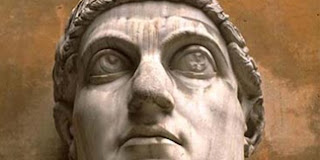Those mighty accomplishments notwithstanding, Doc Hulme is a former cult televangelist who, after bailing out of that faith community, then being dumped from the presidency of a splinter group, now struts his stuff for a tiny, secretive fringe group.
All of which is by way of background to these statements from Hulme in the current issue of Vision. Subject: the book of Revelation.
The apostle John's final written work, the book of Revelation, concludes the collection we call the New Testament... There are many who question the book's authorship. But conservative scholars, basing their opinion on the earliest traditions, believe Revelation to be an authentic work by the apostle John.
This is clearly Hulme's position too, as the article is the nineteenth (!) in a series called The Apostles.
Hulme is absolutely correct when he notes that there are many who question the authorship of the Apocalypse. In fact most not only question, but totally reject the idea that the writer of the other Johannine literature is responsible for it. As for "conservative scholars," it's hard to know who he has in mind. Most mainstream 'evangelical' scholars would want to distinguish the apostle from the author (sometimes referred to as John of Patmos, or John the Elder) who penned Revelation. Bear in mind that nowhere does the author claim to be the disciple who Jesus loved. There is no internal evidence to support Hulme's position.
That the second century church fathers - specifically Irenaeus, Clement, Tertullian and Justin - considered 'St. John' to be the author isn't in dispute, but Hulme hardly stands in a tradition that attaches much value to the 'church fathers'; in fact he'd probably run a mile rather than give them any credibility at all when it comes to other matters of history and doctrine. It has to be conceded that they could indeed be wonderfully inventive when the cause of righteousness required an apologetic flourish. There were other voices though: among those in the early church who questioned the authorship of Revelation was Dionysius, bishop of Alexandria (see below).
There are some really good reasons why the writer of Revelation is highly unlikely to have been one in the same as the disciple/apostle, but Hulme seems to have conveniently forgotten to list them. Why? Given the fact that he seems to go out of his way to rub shoulders with genuine scholars, it's hard to believe that he isn't acquainted with these reasons. For those unfamiliar with them, here's a "Readers' Digest" overview of some.
- Differences between the style of Revelation and the other material ascribed to John. These are too great to be explained away by the use of different scribes. Dionysius mentions these as early as the third century, noting of Revelation that, where the Gospel of John and Johannine letters are skilful compositions, "in neither language nor style does [the author of Revelation] write accurate Greek. He makes use of barbaric expressions and is sometimes guilty even of grammatical error."
- The author of Revelation refers to the other apostles as past founders - with no indication that he is of their number (Rev. 21:14)
- John was one of the most common Jewish names of the era.
- While the Gospel of John shows little concern for the end of the age, certainly less than the synoptic Gospel writers, there is a complete contrast in the single-minded apocalypticism of Revelation.
Of course, there are many other churches which promote an uncritical reading of the Bible, but Hulme is a little different, he appears to play on scholarship. Which leads one to wonder why he can't bring himself to fess up about the uncertain authorship of the Apocalypse. Could it be that a sect like his makes huge use of this book in particular to fuel lurid prophetic speculation, speculation that lies at the heart of their sense of uniqueness and identity, and that consequently any doubt cast on the traditional authorship would seriously undermine the nonsense that undergirds such an approach?










